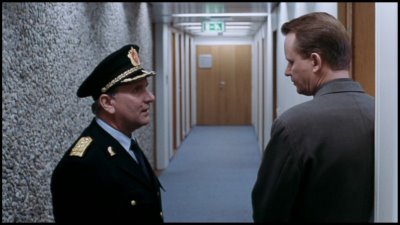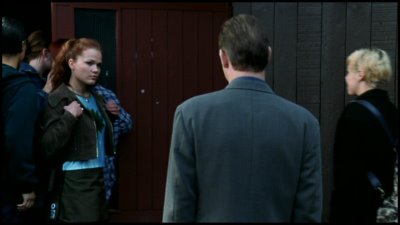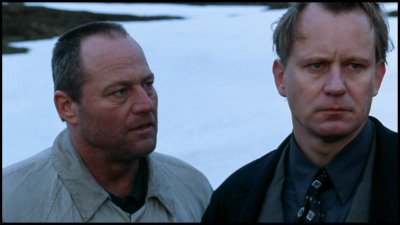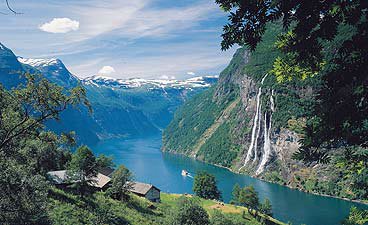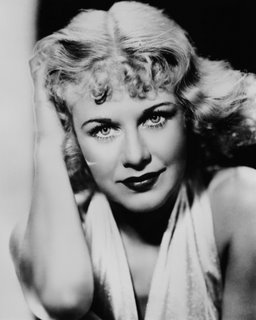 Nora's Nite
Nora's Nite
Sunday, September 24, 2006
Sunday, September 10, 2006
Insomnia (1997)
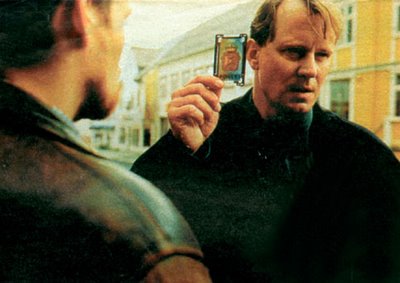
Stuart's Nite
French Pizza, Salad, Ice Cream
Special guest: Lisa
Phrase for the night: Den som synder, sover ikke.
Nikolaj Frobenius Fra Wikipedia, den frie encyklopedi
Nikolaj Frobenius, født i 1965, norsk forfatter som debuterte i 1986 med prosatekstsamlingen Virvl. Utdannet ved London Institute of Screenwriting, har skrevet flere filmmanus og arbeider fra 2005 som filmkonsulent for Norsk filmfond.
Frobenius har tidligere vært redaktør for litteraturtidsskriftet Vinduet. Hans roman Latours katalog er oversatt til en rekke språk.
Frobenius utga i 2004 romanen Teori og praksis, som han kalte en "løgnaktig selvbiografi" om oppvekst på Rykkinn.
Stellan Skarsgard interview via Reel.com:
Q: OK, let's talk about Insomnia. Did you do any research for the role of Inspector Engstrom? Did you see any cop films or go on any police ride-alongs?
SS: No, nothing.
Q: Really? [Notes shuffle frantically.] Well then, did the film have any basis in reality? Have there ever been any serial killer cases in Scandinavia?
SS: Not that I can think of. But I think this sort of crime could happen anywhere in the world. Now, when I say I didn't do any research, I mean I didn't do too much real-world research. The problem in making a character like [Engstrom] is not trying to behave in a police-like manner, but rather to get under his skin and figure out what's happening to him mentally, to show his internal conflict. I'm not so much worried about the physical specifics. I think the real key to making any character believable are the human specifics of his profession and his personality.
Q: What do you think sets Insomnia apart from Hollywood serial killer thrillers like The Silence of the Lambs or Seven?
SS: What sets Insomnia apart is the way [director] Erik Skjoldbjaerg made the movie. The entire picture was closed in, it was isolated from the surrounding area, even the way he shot -- the whole thing was claustrophobic. Also, while the film does have a thriller story with a fast pace, etc., that's not what he concentrated on. He focused more on the breakdown of this guy [Engstrom], who was a supercop, but had gradually been destroyed by his work, and this incident [the murder] especially. He also had a reputation he wanted to uphold. He didn't want to take this particular investigation, but he couldn't afford to lose it if wanted to stay a well-respected professional.
Q: Do you think this kind of inner conflict is missing from a lot of films today?
SS: Yeah, it is, but I always try to find inner conflict in every role I play. I try to find contradictions even incharacters which, in the script, are very weak, very one-dimensional, because it's no fun to just say the f**king words and get out of there. My view of mankind is that everybody, within them, has many contradictions, many conflicts. If I play a bad guy, I try and find some good in him, or at least something that makes him more interesting, more alive than bad. As for good guys, well, they're often good for reasons that are very selfish. I did a lover once in a Moliére play. But rather than just have him be "in love," I made it so he was in love with himself, and in love with himself being in love, but not in love with the woman he was seeing.
Peter Cowie via Criterion:
As a detective who travels to the coastal town of Tromsø to help solve a local murder, Skarsgård’s Jonas Engström finds himself taunted by locals and climate alike. He cannot sleep as the glaucous light of the midnight sun glares through his hotel window, and he loses himself---–and his reason—in the fog-shrouded landscape. This all-pervasive mist forms when the ocean is warmer than the air above it. In the film it creates a mood of claustrophobia as well as ambiguity. Did Engström kill his partner, Vik, during a chase in some rocky wasteland? Is he really interested in the attractive receptionist at the hotel? Does he have a nasty skeleton in the closet of his past?
Skjoldbjærg had been introduced to Skarsgård through Hans Petter Moland, who had made Zero Kelvin with the Swedish star. “The moment he walked through the door in Stockholm, I knew I had found the right actor,” says Skjoldbjærg. Like Jean-Louis Trintignant in Bertolucci’s The Conformist or Marcello Mastroianni in Visconti’s adaptation of Camus’ The Stranger, Skarsgård creates a man who is outwardly assured while harboring profound insecurities within. He cannot handle any kind of intimacy, nor can he come to terms with his responsibility for the death of Vik. He sustains his identity by adhering to certain moral precepts; once he has broken one of these principles, he becomes truly dangerous...
Cannes 1997 via filmfestivals.com:
Unlike many directors," says 32-year-old Norwegian director Erik Skjoldbjaerg, whose feature debut Insomnia is screening today as Norway's second ent in this year's Critics' Week, "I do not claim that I know my characters in every way. I strive hard to understand them, but some of their actions still defy a clear explanation. Actually, I am very thankful for that."
A psychological thriller shot in northern Norway ("but with no glamorous pictures of beautiful nature"), Insomnia follows the investigation of a murder. The corpse of a 17-year-old girl has been found, wrapped in plastic. The local police call for assistance from Kripos, the national detective squad and two experienced criminal investigators are sent to solve the mystery.
A second killing sets the police detectives - played by Swedish actor Stellan Skarsgard (Breaking the Waves) and Sverre Anker Ousdal - off on an intense race, pushing Jonas Engstroem (Skarsgard) towards a mental breakdown. From the lack of sleep, when unsuccessfully trying to shut out the northern light from his hotel room, he enters a state of hallucinations.
"We were struck by the idea of making 'a reversed film noir with light, not darkness, as the dramatic force. And we began guiding our main character through sleepless nights until he gradually lost touch with himself and his ideals," explains Skjoldbjaerg.
From an original screenplay by first-time feature film witer Nikolaj Frobenius, Insomnia was inspired by secrecy. "When you try to hide something from others, you risk losing your own perspective. The secret may involuntarily begin to occupy an increasing part of your own attention. We took this idea to the extreme." Jrn Rossing Jensen.
Why Norway? via VisitNorway.com:
Why Norway?
Imagine a country where nature is a majestic gift to mankind. Imagine a country enjoying the abundance of nature. Accumulated through thousands of years. You will discover a country, which is enchantingly unique. Natural. Imagine a country where light and darkness intertwine. Where seasons melt together in colours and crystals. Imagine a country where the thawing snow gives way to blossom. Where sea and mountain unite. Discover a country where nature creates art. Where you are invited to a life-fulfilling experience of diversity.
Friendly, down-to-earth people, unique scenery, summer nights bright as day and delightful snowy winters make Norway a very special country. In summer, there are plenty of attractions and activities to keep you busy - the unspoilt open country of the Sámi people in the north and fjords, salmon fishing and festivals in the south.
Subscribe to:
Posts (Atom)
